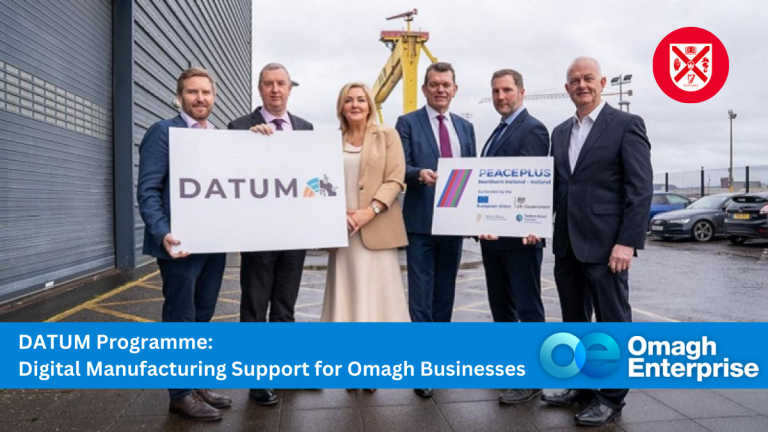Social Farming is an innovative use of agriculture to promote therapy, rehabilitation, social inclusion, education, and social services in rural areas.
The farm is not a specialised treatment farm; rather the farm remains a typical working farm where people in need of support can benefit from participation in the farm’s activities in a non-clinical environment.
It also creates the opportunity to reconnect farmers with their local communities through the opening up of their farms as part of the social support system of the community.
To highlight the benefits of Social Farming and raise awareness of the service, Rural Support hosted its second Social Farming Awareness Week from Monday 2nd October to Friday 6th October. The Social Farming Awareness Week campaign, which was delivered in conjunction with Social Farming Ireland who facilitated open farm visits in the Republic of Ireland, gave those who attended the opportunity to meet participants and hear how being part of the social farm benefits them.
Four farm visits took place over the week and across Northern Ireland with an additional one being held at the end of the month. Those who attended the open days witnessed active Social Farms in practice, gaining an insight into a typical day for participants and how Social Farming benefits both the participants and the farmer.
The week started with a visit to Bradkeel Farm, near Plumbridge. This farm has a dedicated one-acre site within the Campbell family sheep farm found in the peaceful, idyllic slopes of the Glenelly Valley which is an area of outstanding natural beauty in the heart of the Sperrin Mountains. Attendees to this visit got to hear firsthand from Mabel Campbell about why Social Farming is important to her and her farm. Improving the mental health of participants is the main outcome for Mabel, with a focus on horticultural activities and mindfulness.
Attendees got to sample the activities by harvesting lavender from the sensory and healing garden and a mindfulness walk around the farm.
On Tuesday they visited with An Tobar Farm, near Silverbridge. This farm consists of 40 acres of land, in the scenic setting of South Armagh’s Ring of Gullion’s Area of Outstanding Natural Beauty. There is a small herd of suckler cows, a horticultural nursery, and woodland offering a range of activities. The day started hearing from sisters and owners Kathleen and Margaret about how the farm has developed over the years, now a focal point within the community.
Two Social Farming participants led the group on a farm walk showcasing all the activities they do, including planting and growing fruit and vegetables, caring for the many animals onsite, developing a poetry walk, and maintaining the native woodland. The farm delivers Social Farming four days per week to individuals from mental health and learning disability services in the Southern Health and Social Care Trust area.
On Thursday they visited the newest Social Farm, Jigsaw Farm near Coagh. This farm consists of 120 acres of land nestled between the Ballinderry river and Lough Neagh. Attendees were greeted by owners Phelim and Joanna Devlin, as well as the three individuals the farm supports one day per week from learning disability services in the Northern Health and Social Care Trust area.
The main enterprise on the farm includes a suckler cow herd and sheep flock, but there is an array of other small animals for participants to care for including hens, ducks, pigs, goats, a pony and alpacas. Attendees were also surprised to find some non-traditional farm animals on-site – Ollie the parrot, two tortoises, a hedgehog and Jane the snake. The Social Farming participants also explained how they use the large polytunnel for growing fruit, vegetables, herbs, and flowering baskets to complement the seasons.
Phelim Devlin commented: “We are privileged to welcome our participants every week and to host this open farm event. Participants enjoyed showing some of the activities they get involved in. This event has demonstrated the importance of Social Farming to its participants and the positive impact of being in a safe environment where individuals can work closely with nature and develop social connections within their local rural community.”
One participant spoke of his Social Farming experience, saying “coming here is my favourite day of the week. It really helps me.”
The final stop of the week on Friday took everyone to McDermott’s Farm, near Armagh. The former dairy farm lies just 1.5 miles north of Armagh town and although it’s close to the town, you still feel deep in the countryside. The farm keeps a range of small animals, also attached is the woodland where there is developing nature project. There is also a 28-plot allotment where participants can learn and grow seasonal vegetables and flowers. Seaghan and Joanne McDermott have been involved with Social Farming since the pilot programme ‘Social Farming Across Borders’ in 2011. They welcome three services users from learning disability services in the Southern Health and Social Care Trust area every Friday who led the group around the farm and woodland.
Two participants discussed how now they run their own small businesses based on the skills they have developed at the farm.
DAERA has been a key driver in the development of Social Farming in Northern Ireland since 2011, funding Rural Support’s Social Farming Support Service through its Tackling Rural Poverty and Social Isolation (TRPSI) programme.
Gerard Treacy Head of Branch, Rural Affairs
Division (West) attended the visit at Jigsaw Farm and commented: “I am delighted to see first-hand today the impact that Social Farming has on the participants involved and would like to thank Phelim and his team for the work they do here. It is clear to see how much the participants enjoy coming here each week, taking part in everyday farm activities, learning new skills and being part of the team. The ongoing development of Social Farming in Northern Ireland requires farmers to be equipped to deliver a service, to have a funding and referral pathway to facilitate participation, and participants being able to engage. This relies on the continuation of the partnership and cross-departmental working which has been undertaken to date. I would like to also congratulate Rural Support on their commitment to supporting the development and sustainability of Social Farming and to the farmers who work so hard to facilitate this service as a viable alternative to traditional health and social care support.”
Social Farming Awareness Week has provided an excellent opportunity to highlight the benefit of Social Farming and to help raise awareness of the service. An additional Social Farming Awareness day as part of this week is being held on Wednesday 25th October, 10.30am-12.30pm on Wingrove Farm in Saintfield. Booking is essential as numbers are limited. To book a place contact Nikki Foster-Moreira, Social Farming Support Service Co Ordinator on 07544861825 or email socialfarming@ruralsupport.org.uk.
For more information about Social Farming contact Rural Support on 028 8676 0040 or go to the NI Farm Support Hub www.ruralsupport.org.uk.
Source: farminglife.com



